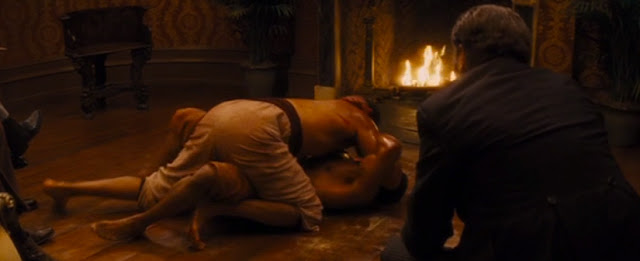Wondering what to write my blog about, I came across the article "When Blaxploitation Went West", written by Aisha Harris. The author assesses D'Jango Unchained's actual status as a western or a blaxploitation film in a very interesting take, yet, I do not want to talk about my views on D'Jango Unchained. Instead, I want to comment on the "mandingo fights", which Harris briefly mentions. I found a minor event in Frederick Douglass's narrative that made me reflect on these.
The brutality of "mandingo fights" is inconceivable for anyone, yet Quentin Tarantino exploits this myth to bolster his film's crudeness. The existence of "Mandingos" is uncertain, but still some claim similar fights did exist. Frederick Douglass's narrative makes me wonder if something along the lines of "nigger fights" or "mandingo fights" could have existed in a minor way. Douglass describes the impassioned discussions and fights slaves had with slaves of alien plantations while debating the greatness of their masters. How could any of them be better than the other? "They seemed to think that the greatness of their masters was transferable to themselves. It was considered as being bad enough to be a slave; but to be a poor man's slave was deemed a disgrace indeed!"(p. 33) says Douglass as he dooms the brutality of his fellow slaves. "Mandingos" are complete aberrations to anyone, but fighting for a slave's master too. It does not differ much from "mandingo fighting". Either way, slaves represented their masters' status, wealth, and "greatness".
One could argue that slaves fought for their masters because of fear and the hope that the masters would reward them some way. Still, it is unbelievable that slaves would say their masters were good. Douglass suggests the most logic answer to these fights as he says, " …he was snatched away, and forever sundered, from his family and friends, by a hand more unrelenting than death.This is the penalty of telling the truth, of telling the simple truth, in answer to a series of plain questions." The ferocity of fighting for a slave's master was due to their intimidation and savagery. Slaves would lie and fight anyone to satisfy their masters' needs. After all it was them who could continue ruining them, or as Douglass describes, "promote" them to a more dignifying (or rather less savage) job.
After watching again the dehumanizing "mandingo fights" I assert these were too extreme. How could they not be extreme? They are Tarantino's deeds. But also, I wonder if these serve as hyperboles of somewhat similar fights like the ones depicted by Douglass. Before reading his narrative I had never thought a slave could really fight in the name of his master.

No comments:
Post a Comment